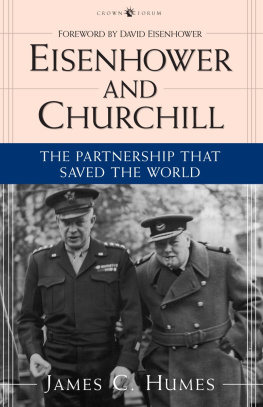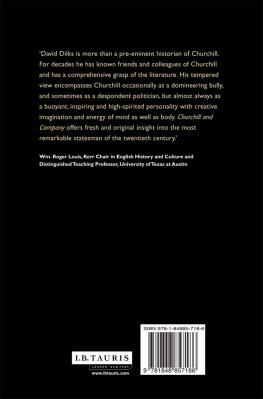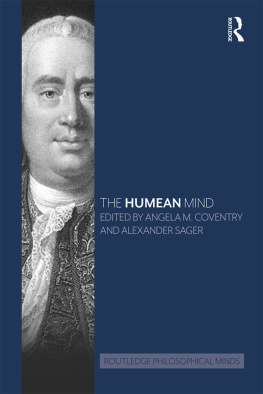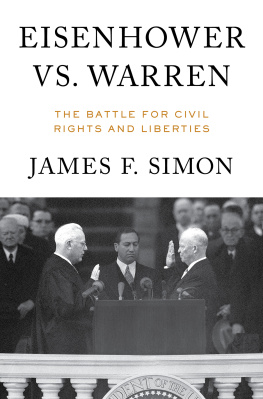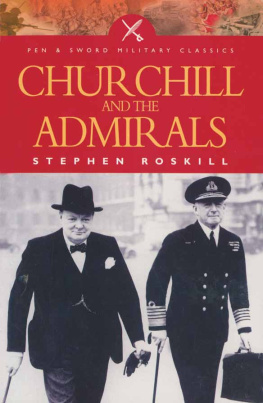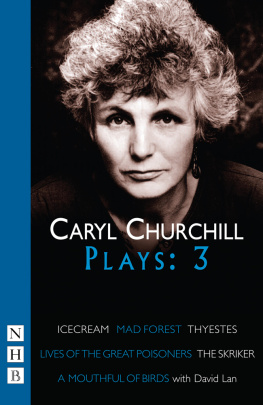James C. Humes - Eisenhower and Churchill
Here you can read online James C. Humes - Eisenhower and Churchill full text of the book (entire story) in english for free. Download pdf and epub, get meaning, cover and reviews about this ebook. year: 2019, genre: Non-fiction. Description of the work, (preface) as well as reviews are available. Best literature library LitArk.com created for fans of good reading and offers a wide selection of genres:
Romance novel
Science fiction
Adventure
Detective
Science
History
Home and family
Prose
Art
Politics
Computer
Non-fiction
Religion
Business
Children
Humor
Choose a favorite category and find really read worthwhile books. Enjoy immersion in the world of imagination, feel the emotions of the characters or learn something new for yourself, make an fascinating discovery.
- Book:Eisenhower and Churchill
- Author:
- Genre:
- Year:2019
- Rating:3 / 5
- Favourites:Add to favourites
- Your mark:
- 60
- 1
- 2
- 3
- 4
- 5
Eisenhower and Churchill: summary, description and annotation
We offer to read an annotation, description, summary or preface (depends on what the author of the book "Eisenhower and Churchill" wrote himself). If you haven't found the necessary information about the book — write in the comments, we will try to find it.
Eisenhower and Churchill — read online for free the complete book (whole text) full work
Below is the text of the book, divided by pages. System saving the place of the last page read, allows you to conveniently read the book "Eisenhower and Churchill" online for free, without having to search again every time where you left off. Put a bookmark, and you can go to the page where you finished reading at any time.
Font size:
Interval:
Bookmark:
WERE IT NOT for my mother, I would not have accepted an English Speaking Union (ESU) scholarship for a year to Stowe School in England. It was the 19521953 year in between Hill School and Williams, and in that magic year I danced with the queen and met Winston Churchill. The seventy-eight-year-old prime minister told this eighteen-year-old schoolboy on May 28, 1953, Study history; in history lie all the secrets of statecraft.
Mother was an Anglophile who would wake me from a nap to hear Winston Churchill speak in 1940. My first long trousers were a copy of an RAF uniform, with miniature wings awarded to my mother for her volunteer work for Bundles for Britain. My daughters inherited the mania. My younger, Rachel, also went to Stowe on an ESU arrangement. The older, Mary, studied Greats at Oxford after Harvard. While managing editor of the Harvard Crimson, when asked her politics, she replied, Monarchist.
And were it not for my wife, Dianne, I would never have become friends with the Eisenhower family. She worked in the Eisenhower White House. (She was one of the few who found Governor Sherman Adams, the former governor of New Hampshire, warm and friendly, perhaps because they were both New Englanders.) She first served under her fellow Massachusetts native Max Rabb and then under Robert Gray in the area of appointments. While she was there, we met and became acquainted with Roemer McPhee (who had been friends with my cousin John Humes at Princeton), Ed McCabe, and Gerry Morgan while I was attending George Washington Law School. (In 1961, I clerked at their law firm, Hamel, Morgan, Park, and Saunders, in Washington.) Others we met and saw regularly included Ann Whitman; Mary Jane McCaffery, the social secretary; and Abbott Washburn. Another was Rev. Fred Fox, a former Congregational minister for whom I taught Sunday school while at Williams College. In late 1960 Fox had me write a few ceremonial remarks for an Oval Office presentation by President Eisenhower.
In 1962, while a candidate for the Pennsylvania General Assembly, I was invited to Gettysburg to see General Eisenhower. We discussed Churchill, to whom Eisenhower had just sent a letter, wishing him congratulations on his sixtieth year in the House of Commons. In 1967 I also drafted some remarks for Eisenhower. I was at the time working with then Col. John Eisenhower, who headed an early national citizens committee for Nixon.
Over the years I have kept up my friendship with John Eisenhower. He is a scholar and an intellectual (although he would deny the description). He is also one of the worlds finest military historians. His children, David and Susan, have inherited his writing ability. Their mother, Barbara, has been a familiar warm face and friend for thirty-five years!
I was also a guest of Milton Eisenhower for two nights at his home at Johns Hopkins University. He regaled me with stories of his youth with Ike in Abilene. He insisted that Ike was the most intelligent of all the Eisenhower brothers.
David and Julie Nixon Eisenhower have been both personal and political friends with Dianne and me, sharing our passion for politics and history (and with David and myself, baseball.) David wrote the foreword for my book The Wit and Wisdom ofBenjamin Franklin, and Julie wrote the foreword to my autobiography, Confessions of a White House Ghost Writer: Five Presidents and Other Political Adventures. Julies father, President Nixon, for whom I was a one-time White House writer, wrote the introduction to my book The Wit and Wisdom of Winston Churchill.
In the half century since I studied at Stowe, I have also made many British friends, including some from the Churchill family. Sir Winstons son Randolph entertained me at a dinner in Blackpool in 1963. (I was then a Pennsylvania legislator on an ESU speaking tour in England and attending the Conservative Party conference at that seaside resort.) Randolph really was an entertaining host and raconteur. I have also many times been the guest of Winston Churchill II, his son, in the House of Commons, at his house, and at his club, Bucks. Winston has inherited the Churchillian flair at the podium and facility with the pen.
I have come to consider as a friend his cousin Edwina Sandys of New York, who has inherited from her grandfather not only his sandy hair and fair complexion but also his artistic flair. She is a prize-winning artist and sculptor. Her sculpture from the ruins of the Berlin Wall now adorns the Churchill Museum at Westminster College in Fulton, Missouri, where I once spoke on the thirty-third anniversary of Churchills Iron Curtain address at that college.
I have twice been the guest of the venerable Grace Hamblin, once a Churchill secretary, who now lives at Westerham, Kent (near Churchills home, Chartwell). A statue of Sir Winston stands outside her cottage. She is a fascinating source of anecdotes about Churchill and his working habits and private pleasures. I was referred to Grace Hamblin by Anthony Montague-Browne, private parliamentary servant (PPS) to Sir Winston for a score of years until Churchills death. A fellow Old Stoic, he arranged for me to meet Lady Churchill in 1966 at a formal dinner honoring her husband, who had died the year before.
My wife and I were also the household guests of Lord and Lady Avon in 1970. The former Anthony Eden was then the leader of the Conservative Party in the House of Lords. His wife, Clarissa, was Churchills niece. In that visit I learned much about Churchills wartime tenure as prime minister.
Her brother John Spencer Churchill (another artist, as well as raconteur) was our guest twice in our house in Washington. He was full of stories about his grandmother Lady Randolph. Through John Churchill, I met the late Kay Halle, a friend of the Churchill family who authored books on Churchill and his son, Randolph. When I lived in Philadelphia and visited Washington, I was often a guest at her home at Dent Place in Georgetown. She was the key figure in organizing the honorary U.S. citizenship granted Sir Winston in 1963. She had been a frequent guest at Chartwell both during the 1930s and later after World War II. I also dined in a small group with former Prime Minister Harold Macmillan (later Earl of Stockton) twice, once in 1966 at a small table at the Beefsteak Club in London and again at the Smithsonian Institution, where he spoke in 1981.
In 1960 I met in Washington, as a delegate to the Young Political Leaders of NATO conference, the Hon. James Dugdale (now the second Baron Crathorne). We, the two Jamies, have been friends for over forty years. His father, Sir Thomas Dugdale, was a PPS to Prime Minister Stanley Baldwin and later a minister in Churchills second cabinet. He hosted us at Crathorne Hall in Yorkshire on two occasions. His son Jamie Crathorne, a godson of Lord Mountbatten, now heads the Arts Committee in the House of Lords. Lord Crathorne wrote the introduction to my biography Citizen Shakespeare. He is a frequent lecturer and writer on art and has spoken at the Metropolitan Museum on The Palace of Westminster.
Other English friends include Commander and Baroness Byford. Hazels father was Sir Cyril Osborne, who served in the House of Commons during the Churchill era for many years as a Conservative from Leicestershire. Hazel is now the shadow minister in charge of agricultural matters for the Conservative Party in the House of Lords.
Lord Cope, who once served in the Thatcher and Major governments, is a principal leader of the Conservative opposition party in the House of Lords. John and Djemila Cope encouraged me to write this book some years ago.
I should also mention Sir Alec Douglas-Home, once prime minister and twice foreign secretary. His mother, the Countess of Home, gave a reception for us when my wife and I were married in Scotland in 1957. He was our host once at a luncheon in Carlton Gardens when he was foreign secretary and again in the House of Lords a year before he died. (I am distant kin, being a member of the Hume clan.) Home, as former Prime Minister Edward Heath told me, was next to Churchill the greatest prime minister in terms of character, integrity, and principle in this century. His sister-in-law, Felicity Douglas-Home, continues to be a warm friend whom we see in Scotland.
Font size:
Interval:
Bookmark:
Similar books «Eisenhower and Churchill»
Look at similar books to Eisenhower and Churchill. We have selected literature similar in name and meaning in the hope of providing readers with more options to find new, interesting, not yet read works.
Discussion, reviews of the book Eisenhower and Churchill and just readers' own opinions. Leave your comments, write what you think about the work, its meaning or the main characters. Specify what exactly you liked and what you didn't like, and why you think so.

